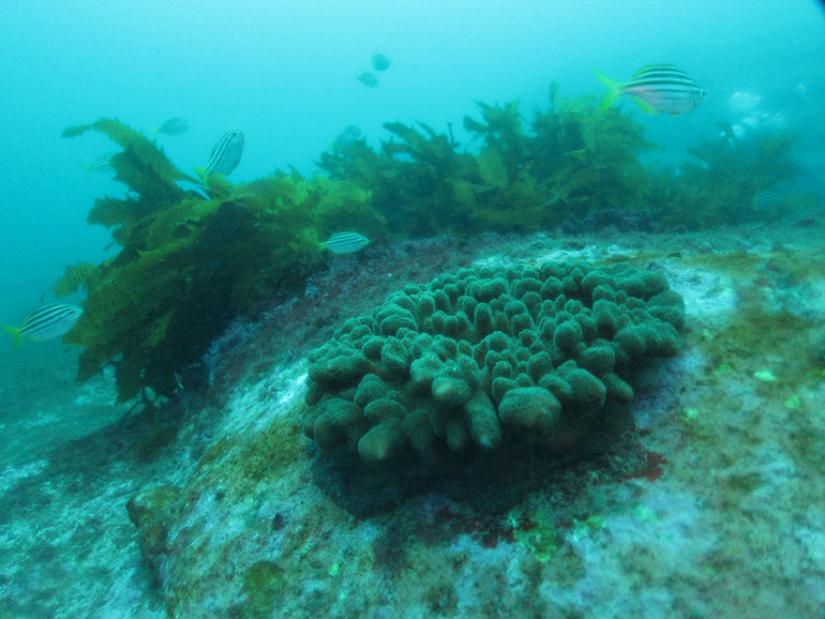A number of coral species call coastal Sydney home. Of course the variety and complexity of Great Barrier Reef species is missing but encrusting corals happily inhabit Sydney’s temperate ecosystem. However the recent colonisation of Sydney waters by a branching coral species from the north raises important questions for marine biologists – will these new species find a refuge in Sydney, thus enhancing marine biodiversity, or will they turn out to be no more than invaders and change Sydney reef architecture?

UTS led research is looking at impact of tropicalisation of Sydney Harbour corals. Credit: Brigitte Sommer
PADI Foundation Grant
A team of experts from University of Technology Sydney and University of Sydney will now get the chance to study the impacts of this sub-tropicalisation of coastal Sydney thanks to a PADI Foundation Grant.
Dr Jennifer Matthews from UTS Climate Change Cluster will lead the investigation with UTS Professor of Marine Biology David Booth and University of Sydney specialists Associate Professor Will Figueira and Dr Brigitte Sommer. The main objective is to identify the traits that are allowing new sub-tropical species of corals to expand their range into the southeast coast of Australia.
“ Protecting Australia’s marine biodiversity is one of the major challenges we face. So, on the face of it, coral species from the GBR using the cooler waters of Sydney as a refuge seems like a good conservation strategy,” Dr Matthews says.
“ Sydney is well south of the nearest coral reefs but my UTS colleague Dave Booth has been documenting the arrival, and survival, of tropical fishes for many years. While high-latitude reefs are less than optimal coral habitats, they are increasingly considered to be possible refuge sites for tropical reef species from global change,” she says.
The team will focus on a recent arrival, a branching coral (Pocillopora aliciae) that, unlike native encrusting corals, have a complex structure that can shelter tropical fish communities.
The team will focus on a recent arrival, a branching coral (Pocillopora aliciae) that, unlike native encrusting corals, have a complex structure that can shelter tropical fish communities.
“So potentially lots of new fish and corals to see on snorkel and diving visits in Syndey! But there are important potential consequences to consider. For example, could the new residents negatively impact existing Sydney marine habitats? That’s what this PADI grant will allow us to explore,’ Dr Matthews says
The Research
For the first time molecular tools will be used to characterise the corals’ population demographics, with 3D mapping of Sydney ‘reefs’, underwater (fish) surveys, and competition experiments in UTS Environmental laboratories completing the picture.
“It’s exciting to be able to address critical questions around the physiological and behavioural traits of these sub-tropical species to be able to get an understanding of their capacity to survive, thrive and reproduce in temperate reefs
“Our results will provide novel insights about the ecological implications of tropicalisation of temperate reef ecosystems and help determine whether coastal Sydney can act as refuge from global change for the biodiversity from the GBR,” Dr Matthews says
“Our results will provide novel insights about the ecological implications of tropicalisation of temperate reef ecosystems and help determine whether coastal Sydney can act as refuge from global change for the biodiversity from the GBR,” Dr Matthews says
The PADI Foundation encourages and supports research and education related to aquatic environments.Since 1992 the Foundation has awarded almost $4.7 million to almost 900 projects. In 2020 there were over 400 grant applications of which 38 received grants totalling approximately $185,000.
Links:

